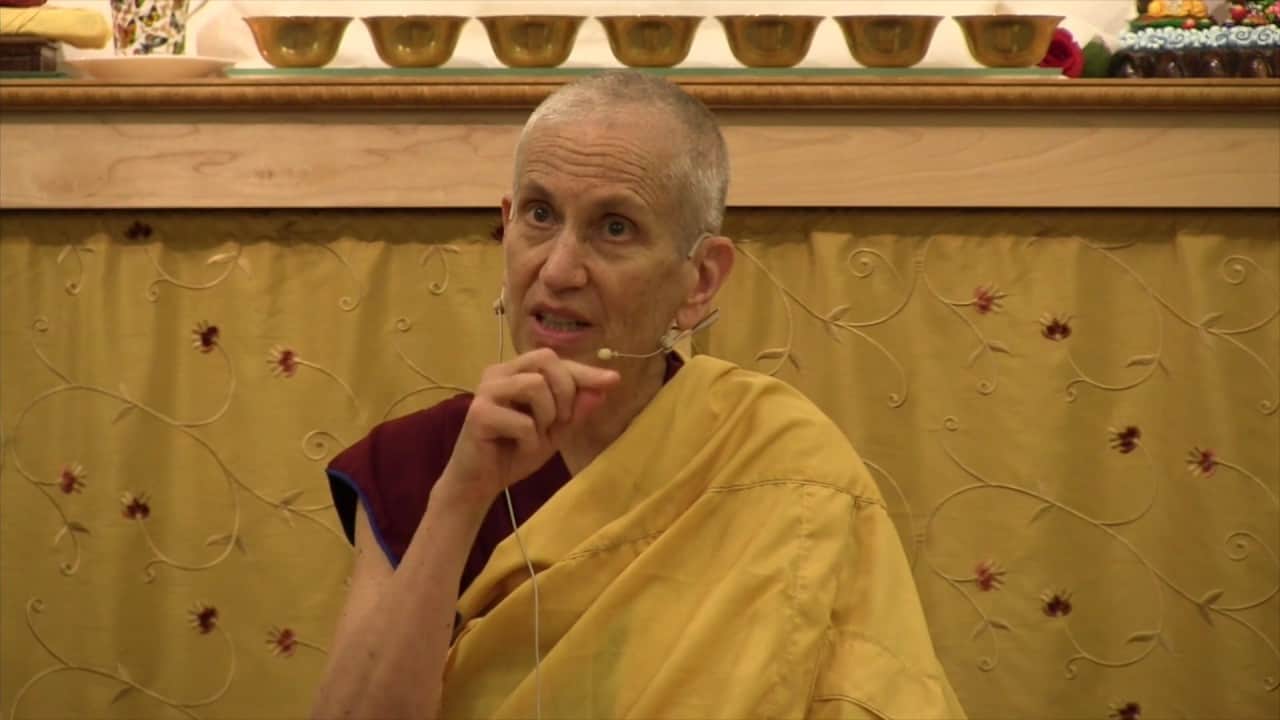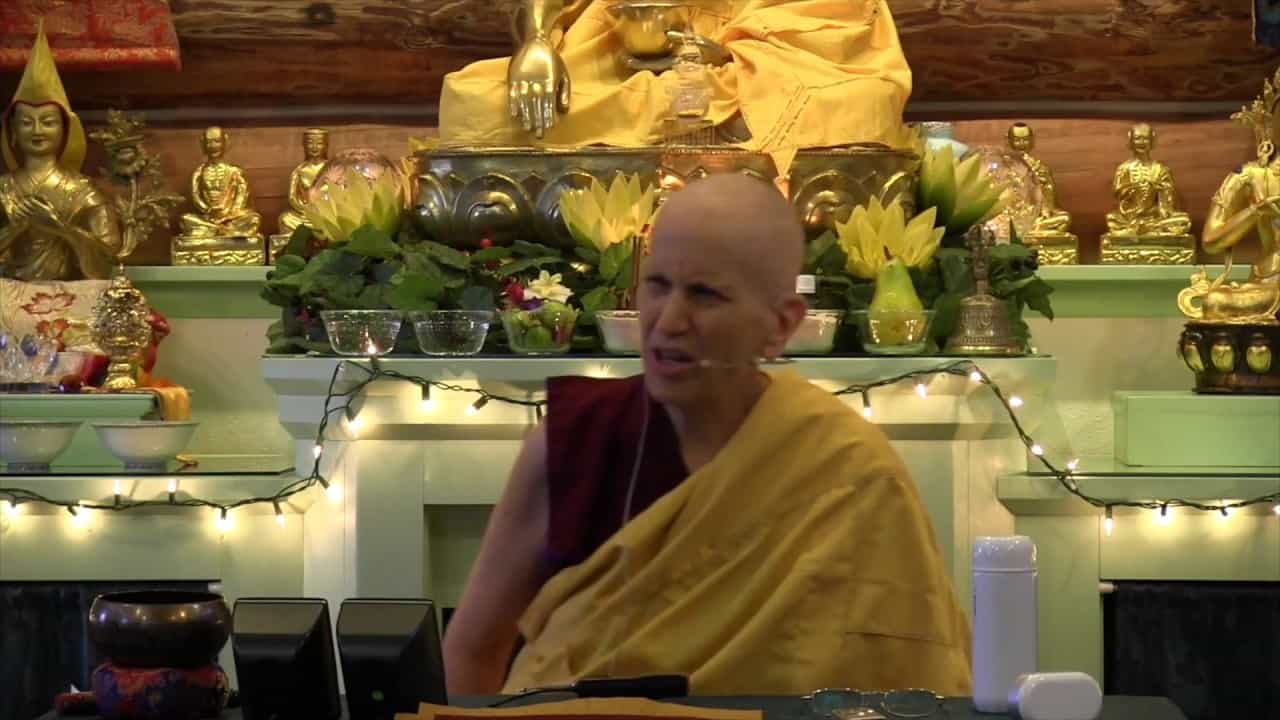Great resolve and bodhicitta
The text turns to training the mind on the stages of the path of advanced level practitioners. Part of a series of teachings on the Gomchen Lamrim by Gomchen Ngawang Drakpa. Visit Gomchen Lamrim Study Guide for a full list of contemplation points for the series.
- Review of the first five of the seven point cause and effect instruction to generate bodhicitta
- Generating the great resolve by studying the 18 unshared qualities of a fully awakened one
- How developing these 18 qualities benefits others and makes our life meaningful
- Identifying the self-centered thought as the source of our misery
Gomchen Lamrim 72: Generating great resolve and bodhicitta (download)
Contemplation points
Contemplating the eighteen unshared qualities of an awakened one
Take the time to really think through each one, how they benefit ourselves and others. Imagine to what extent you might have a similitude of these qualities now and how you might develop them in your daily life.
Six unshared behaviors
- Due to mindfulness and conscientiousness, a Buddha has no mistaken physical actions whether he is walking, standing, sitting or laying down; they act in accordance with what they say and their speech satisfies what each sentient being who is listening needs to understand at that moment (imagine having purified your mind to the extent that you have this; you don’t act inappropriately).
- Buddhas always speak appropriately, truthfully, and kindly and so are free from mistaken speech and idle talk.
- Buddhas are free from any kind of forgetfulness that interferes with meditative stability and exalted wisdom, or with viewing beings and teaching them appropriately.
- Buddhas always abide in meditative equipoise on emptiness and they simultaneously teach beings the Dharma.
- Buddhas do not perceive any discordant appearances of a self and of inherent existence, and thus they recognize all phenomena as sharing the one taste of being empty of inherent existence. In addition, Buddhas do not treat beings with bias; they always treat them as free of prejudice. Imagine what it would be like to have leaders like this; to BE like this.
- Buddhas abide in perfect equanimity, knowing the individual characteristics of each phenomena. Usually when WE know the characteristics of phenomena, then we get into “I like this, I don’t like that. I want this, I don’t want that…” We are anything but equanimous, but a Buddha is able to maintain perfect equanimity and yet see all the qualities of all phenomena. Their opinion factor isn’t working overtime, unlike ours.
Six unshared realizations
- Due to their all-encompassing love and compassion, Buddhas never experience any decline in their aspiration and intention to benefit all beings and to increase the virtuous qualities of beings. Their love and compassion is firm, stable.
- Buddhas never lose joyous effort to lead others to awakening. They experience no physical, verbal, or mental fatigue and continuously care for the welfare of beings without getting tired, lazy, despondent, or jet-lagged. It’s all about how we condition and train ourselves, the energy we put into it.
- Buddhas mindfulness effortlessly remains constant and uninterrupted. They are mindful also of the situations that each being encounters in the past, present, and future, and the methods used to subdue and help those beings.
- Buddhas continuously remain in samadhi, free from all obscurations and focused on the ultimate reality. They don’t have a wandering mind; they are single pointed on the nature of reality.
- Buddhas wisdom is inexhaustible and never declines. They perfectly know the 84,000 Dharma teachings and the doctrine of the three vehicles, as well as how and when to express them to sentient beings. Sometimes, we have good intentions, but we don’t know what to say, or we know what to say, but we don’t stop and think about WHEN to say it, and instead of helping someone, we create confusion. What would it be like to have that quality where we intuitively know the right thing to say or do at the right time that will work for someone? This doesn’t mean that as a Buddha, you can snap your fingers and completely change all beings. Rather, Buddhas see the long-term picture and can say something that plants a seed in another person’s mind that will later ripen and help them think more clearly.
- It is impossible for Buddhas to lose the state of full awakening, free from obscurations. They know the mind to be naturally luminous and lack any dualistic appearance or grasping at duality.
Three unshared awakening activities
- Imbued with exalted wisdom, a Buddha’s physical actions are always done for the benefit of others. They can emanate many bodies that appear wherever sentient beings have the karma to be led on the path to awakening and whatever a Buddha does has a positive effect on those beings.
- Knowing the dispositions and interests of each being, Buddhas teach the Dharma in a manner appropriate for each individual. Their speech is lovely to listen to, accurate, truthful, and it is always knowledgable, kind, and spot on.
- Filled with un-declining love and compassion, Buddhas minds encompass all beings with the intention to do only what is of the highest benefit. They ONLY think of what can be of the greatest benefit to all beings.
Three unshared exalted wisdoms
- Buddhas exalted wisdoms know everything in the past without any obscuration.
- Buddhas exalted wisdoms know everything in the present without any obscuration.
- Buddhas exalted wisdoms know everything in the future without any obscuration.
The suffering of the self-centered thought
- Take some time to consider difficult situations in your life, past or present. How is the self-centered thought operating behind the scenes?
- What are the disadvantages of the self-centered thought? What kinds of thoughts does it provoke? How do those thoughts lead you to act and how does that cause suffering both now and in the future?
- How is the self-centered thought behind the complaining mind?
- How does the self-centered thought thwart both worldly and spiritual aspirations and goals?
- What antidotes can be applied to counter the self-centered thought? Consider how the Buddhist worldview offers a new way of thinking that combats the self-centered thought and leads to real and lasting happiness.
- Seeing the self-centered thought as our enemy, not a friend, resolve to be vigilant in your daily life, apply antidotes whenever it arises.
Venerable Thubten Chodron
Venerable Chodron emphasizes the practical application of Buddha’s teachings in our daily lives and is especially skilled at explaining them in ways easily understood and practiced by Westerners. She is well known for her warm, humorous, and lucid teachings. She was ordained as a Buddhist nun in 1977 by Kyabje Ling Rinpoche in Dharamsala, India, and in 1986 she received bhikshuni (full) ordination in Taiwan. Read her full bio.


